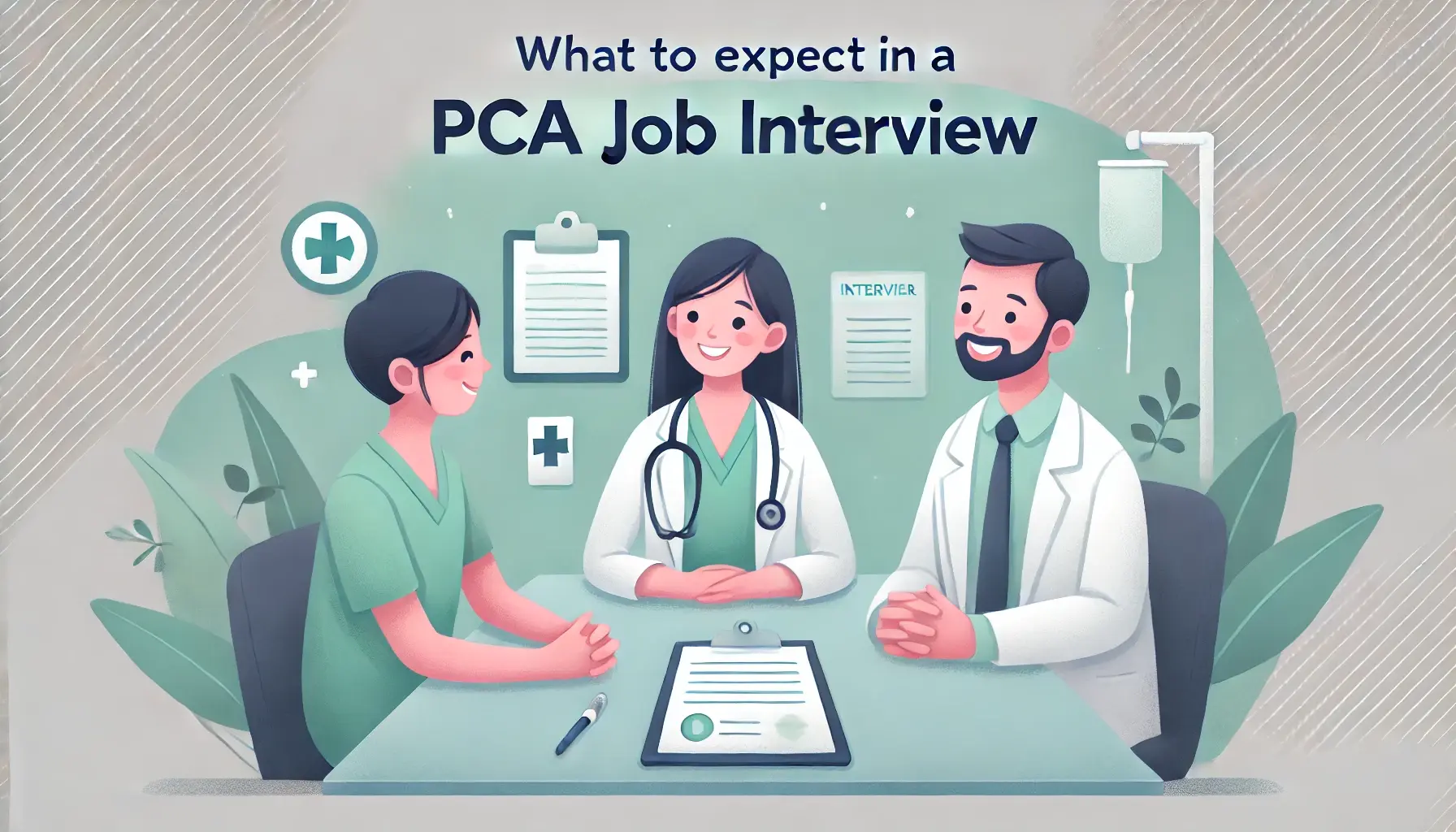If you’re considering a career as a Personal Care Aide (PCA), you're likely drawn to the opportunity to make a real difference in people's lives. The role requires a unique blend of compassion, responsibility, and practical caregiving skills. But before you begin your journey, it’s essential to ace the interview process. Whether you're applying to an agency like GoodCare Home Health Services or elsewhere, this guide will give you an in-depth look at what to expect during a PCA job interview and how you can make the best possible impression.
1. Preparing for the PCA Interview
Preparation is the foundation of success in any job interview, and the PCA interview is no exception. Before the big day, make sure you:
Research the agency: It's crucial to understand the values, mission, and services of the company you're interviewing with. For instance, if you're applying to GoodCare Home Health Services, familiarize yourself with their approach to treating both their clients and staff like family. This will not only show your interest in the company but also allow you to align your answers with their expectations.
Understand the PCA role: Review the duties of a Personal Care Aide. PCAs assist clients with daily living activities like bathing, dressing, cooking, and light housekeeping. Additionally, they provide companionship and emotional support. Knowing the expectations of the role will help you better answer questions about your experience and qualifications.
Review your own experience: Even if you’re new to the field, think about any previous jobs or personal experiences where you’ve had to care for others. Highlight transferable skills, such as patience, time management, and communication.
2. Common PCA Interview Questions and How to Answer Them
During the interview, you’ll face a combination of general questions and those specific to the caregiving field. Below are common questions you may encounter, with guidance on how to answer them effectively:
What made you apply at GoodCare Home Health Services?
When this question comes up, it’s your chance to express why you’re drawn to the agency in particular. You might say something like:
“I was impressed with how GoodCare emphasizes treating both clients and caregivers like family. It shows a deep respect for the personal relationships involved in caregiving. I’ve always believed that quality care stems from creating meaningful connections, and that aligns with my personal values.”
You could also mention specific services or policies the agency offers, such as the way they keep cases close to home for aides, which shows a thoughtful approach to making work more convenient for caregivers.
On a scale of 1-10, how reliable are you?
Be honest but use examples to support your rating. Reliability is crucial in caregiving, where patients depend on you daily.
A good response might be:
“I’d rate myself a 9. I’ve always been committed to showing up on time, and in my previous job, I rarely missed a shift. I understand that clients rely on consistency, and I make sure I’m always dependable for those in my care.”
Are you looking for full-time or part-time work?
Whether you’re open to both or prefer one over the other, be clear in your answer. Agencies like GoodCare may have varying needs, and flexibility can be a plus, but make sure to align your answer with what you can commit to long-term.
What do you feel your strengths are?
This question lets you highlight the qualities that make you a great fit for the role. Think about qualities like your compassion, communication skills, or ability to stay calm under pressure.
A sample response:
“I think one of my greatest strengths is my empathy. I’ve always been able to connect with people on a personal level, which is important when providing care. I also have strong time management skills, which helps me balance my responsibilities efficiently while ensuring the client receives the attention they deserve.”
What do you feel is a weakness of yours?
No one likes talking about their weaknesses, but interviewers appreciate honesty. Choose a weakness that won’t hinder your ability to perform as a PCA and show how you’re working to improve.
For example:
“I can be a bit of a perfectionist, which sometimes means I take on too much responsibility. However, I’ve been working on delegating tasks and prioritizing to avoid burnout, and it’s helped me become more effective in my work.”
Tell me one thing you love about home health care.
Here’s your chance to share your passion for caregiving. Maybe you love the personal connections you make with clients or the ability to see the direct impact of your care.
A thoughtful answer could be:
“I love the relationships I build with clients. Being able to make someone’s day brighter, whether it’s through helping them with daily tasks or just offering companionship, is incredibly fulfilling. I’ve always enjoyed the one-on-one nature of home health care.”
Tell me a struggle you find with home health care.
Be honest but constructive in your response. Perhaps the emotional aspect of seeing clients struggle with their health is challenging, but it’s important to follow up with how you handle those situations.
For example:
“One challenge I’ve found is dealing with the emotional toll when clients’ health declines. It’s tough because you grow close to them. However, I remind myself that my job is to make their life as comfortable as possible, and I try to stay positive and supportive for their sake.”
3. Engaging in Conversation
After answering these questions, expect the interviewer to engage you in conversation based on your answers. If you mention how much you enjoy building relationships with clients, the interviewer may ask you to provide an example of a time you formed a meaningful connection. If you discuss the challenges of the emotional aspects of the job, they may ask how you maintain a positive attitude. Be prepared to offer more details and personal experiences to further demonstrate your qualifications and passion for caregiving.
4. What GoodCare Home Health Services Offers You
After the initial round of questions, the interviewer will likely share more information about what GoodCare Home Health Services can offer you as an employee. This part of the conversation helps you get a clearer picture of what your day-to-day experience will look like:
Convenient client assignments: At GoodCare, we strive to make work convenient for our aides by ensuring that cases are near your home and close to each other. This minimizes your travel time and makes it easier to manage multiple clients without spending hours commuting between assignments. We want to make sure you're not stretched too thin by unnecessary travel, which also helps you focus more on providing the best care.
Competitive wages: We believe in paying competitive wages to ensure that our staff feels valued and motivated. We know how hard our caregivers work, and we strive to offer a compensation package that reflects that dedication.
Family-oriented care: Our goal is to hire caregivers who treat their clients with the same care and attention they would give their own parents or grandparents. We want both our clients and our caregivers to feel like part of the GoodCare family.
Next steps in the hiring process: The interviewer will explain that after your interview, we will conduct a background check. Once that is complete, we will call you for orientation and further instructions on beginning your role as a PCA. We’re excited to move forward with candidates who share our values and commitment to high-quality care.
5. Questions You Should Ask
An interview is a two-way street. Now is your chance to ask questions that will help you determine if the job is a good fit for you. Some possible questions include:
How are shifts scheduled, and can I choose my availability?
What kind of training and support does GoodCare offer for new hires?
Are there opportunities for advancement within the company?
How does the agency support caregivers in difficult situations?
At GoodCare Home Health Services, we have an open-door policy that encourages caregivers to communicate openly about any issues or concerns they may have. We believe that strong communication is key to creating a supportive work environment, and we want you to feel comfortable reaching out whenever you need help or guidance.
6. Closing the Interview
As the interview wraps up, the interviewer will likely ask if you have any further questions. They may also emphasize that GoodCare values caregivers who are hardworking and dependable, and that they’re looking for staff who will treat clients with compassion and respect. Finally, they’ll explain the next steps, including the background check and the call for orientation.
Final Thoughts
A PCA job interview is more than just a formality—it’s a chance for both you and the agency to determine if you’re a good fit for each other. At GoodCare Home Health Services, we’re looking for caregivers who are passionate, reliable, and dedicated to providing high-quality, family-oriented care. By preparing thoroughly, being honest, and showing your commitment to caregiving, you can make a great impression and take the next step toward joining a team that values you as much as the clients you care for.
Good luck with your interview, and we look forward to welcoming you to the GoodCare family!


